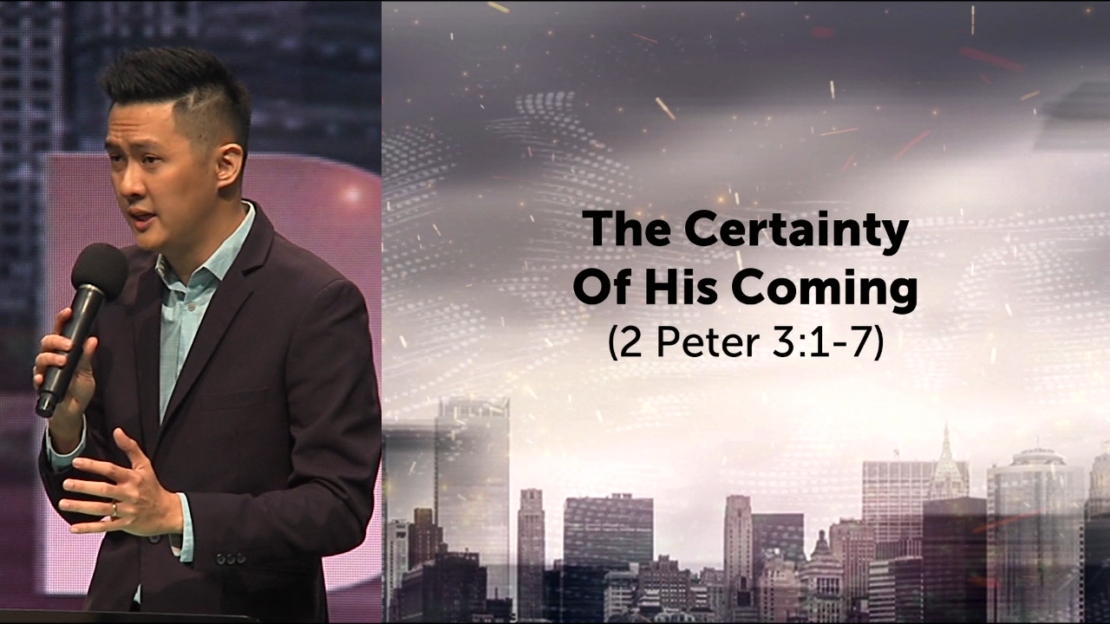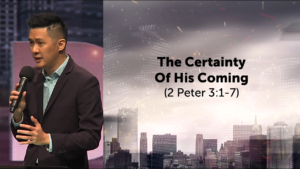Endgame (1/4): The Certainty of His Coming
THE CERTAINTY OF HIS COMING
2 Peter 3:1-7
Series: Endgame – Becoming Future Ready
“Future ready” is usually defined as the ability to plan with foresight, keep up with the times and be resilient in the face of uncertainty. But what does the Bible say about being future ready? What is the right view of the future we should have?
Discussion Guide
1) The wrong view: Christ will not judge the world (3-4)
The term “judgment day” is often used to describe moments in life where we come to face something truly important, usually with a tinge of fear or dread. For example, the announcing of restructuring in your company, the day of a job interview, or the release of national exam results. What thoughts come to mind when someone mentions “judgement day”? What feelings get stirred? As Christians, what is our understanding of judgment? Discuss in your Life Group.
In 2 Peter 3:3-4, the Apostle Peter warned believers of the presence and teachings of “scoffers”. What was wrong about their message on judgment and the coming of Jesus? What was their reason for thinking that Jesus will not come? How did their belief guide the way they lived their lives? Would you say they answered to themselves or to God? Why? What happens when people live as if they are accountable to no one else but themselves?
“The greatest tragedy in this lifetime is knowing Christ, yet carrying on living as if we do not.” Reflect on how knowing Christ has affected the way we live our lives, e.g. choosing to prioritise people because they matter to God. Share 1-2 areas to your Life Group and give thanks together for what God has done. Are there areas in our lives that are yet to be influenced by Christ and His gospel? Identify what might be stopping you from yielding these areas to God, and resolve to speak to your mentors or leaders about it.
2) The right view: Christ will return to judge the world (5-7)
Living in a busy city like Singapore means that much of our focus and attention is naturally drawn to the daily demands of life. It is easy to get caught up living for the here and now, with immediate rewards like work promotions and long holidays providing encouragement for our next chase. Do the people around you live in such a way, for the here and now? Share how they exhibit this in the type of decisions they make for themselves.
In contrast with the false teachers who denied Christ’s coming and thought that they did not need to account to Him, Christians know from Scripture that God will carry out His promise to judge the world in the future. How does Christ’s coming alter our view of the future? Realising that we have to answer to Him, what truly matters in this life on earth?
Think about some people you know who role-model and set good examples for how one should live. How do they exhibit their beliefs in the decisions they make? Consider how we have been orientating our lives and what we have been striving towards daily. What occupies our time? What drives our work and use of resources? Are there some decisions we need to make for ourselves regarding the way we live our lives today? Commit to respond to God today.
Come together as a Life Group to pray, that every member will grow to make every earthly decision in light of Christ’s coming and our eternity with Him.
Reflection Questions
1) The wrong view: Christ will not judge the world (3-4)
In 2 Peter 3:3-4, the Apostle Peter warned believers of the presence and teachings of “scoffers”. What was wrong about their message on judgment and the coming of Jesus? What was their reason for thinking that Jesus would not come? Would you say they answered to themselves or to God? What happens when people live as if they are accountable to no one else but themselves?
2) The right view: Christ will return to judge the world (5-7)
In contrast with the false teachers who denied Christ’s coming and thought that they did not need to account to Him, Christians know from Scripture that God will carry out His promise to judge the world in the future. How does Christ’s coming alter our view of the future? Realising that we have to answer to Him, what truly matters in this life on earth? What occupies our time? What drives our work and use of resources?

